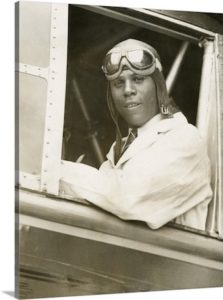
Hubert Julian
The birth of Hubert Julian in 1897 is marked on this date. He was a Black aviation pioneer and businessperson.
Born in Trinidad, Hubert Fauntleroy Julian came from a well-to-do family, which sent him to school in England. The dangers during World War I caused the family to move him to Montreal. Julian’s first plane ride came in November 1919, with WW I hero Billy Bishop for a ten-minutes in a Sopwith Camel. Unlike Bessie Coleman, William Powell, and James Herman Banning, Julian had no trouble finding someone to teach him to fly. By 1921, now living in New York, he had become a “gentleman flyer,” a man about town, and a sharp dresser. He was a supporter of Marcus Garvey and, in 1922, flew his plane over parades in support of Garvey.
In July 1924, Julian intended to fly to Africa and become the first person to fly solo across the Atlantic Ocean. He dubbed his airplane Ethiopia I and began to raise money for the trip. His plane crashed into the water off Flushing, New York, and Julian spent the next month in the hospital recovering from injuries.
His 1929 Trans-Atlantic flight, made two years after that of Charles Lindbergh, was commemorated by Calypso music singer Sam Manning in the recording “Lieutenant Julian.” He became a well-known figure in the African American and Afro-Caribbean community and was billed as "The Black Lindbergh."
Julian flew to Ethiopia in 1930, where his flying exploits impressed Emperor Haile Selassie, who awarded Julian Abyssinian citizenship and the rank of colonel. In 1931, he was the first African American to fly coast to coast in the United States. Julian was one of several aviators who competed with others in the 1920s and 1930s, briefly holding records for longest nonstop flights. 1931, for example, Julian held the nonstop nonrefueling aviation endurance record with a flight of 84 hours and 33 minutes. Julian flew several flights in and between the Americas, Europe, and Africa, surviving several crashes. He headed between major flights and toured with a small all-Black flying circus called The Five Blackbirds.
During the Italian invasion of Ethiopia in 1935, Julian flew to Ethiopia to defend Selassie's government. He commanded their Ethiopian air force, which consisted of three planes. After getting into a public fistfight with Black aviator John C. Robinson, he was ordered to leave the country.
Julian also invented some safety devices used in airplanes. Julian also acted as a producer for the 1939 motion picture Lying Lips. After the United States entered World War II, Julian volunteered to train for combat with the Tuskegee Airmen. He was a colorful character who wore a non-regulation colonel's uniform, although he held no rank with the United States Armed Forces. he was discharged before graduation.
In the 1940s, Julian lived in Harlem as a local celebrity. Hubert Julian was a staunch aviation promoter and one of the first blacks to get a pilot's license in the United States. A series of articles titled "Black Eagle" was published in the New York Amsterdam News newspaper in 1937 and 1938. In 1965, his biography, Black Eagle, was published by The Adventurers Club in London; a (different?) book with the same title by John Peer Nugent was published in 1971.
The November 1974 issue of Jet magazine said Julian (then 77 years old) was planning to rescue Haile Selassie, then believed to be held prisoner by the new government of Ethiopia. The date of Hubert Julian’s death is February 19, 1983.
The African American Desk Reference
Schomburg Center for Research in Black Culture
Copyright 1999 The Stonesong Press Inc. and
The New York Public Library, John Wiley & Sons, Inc. Pub.
ISBN 0-471-23924-0